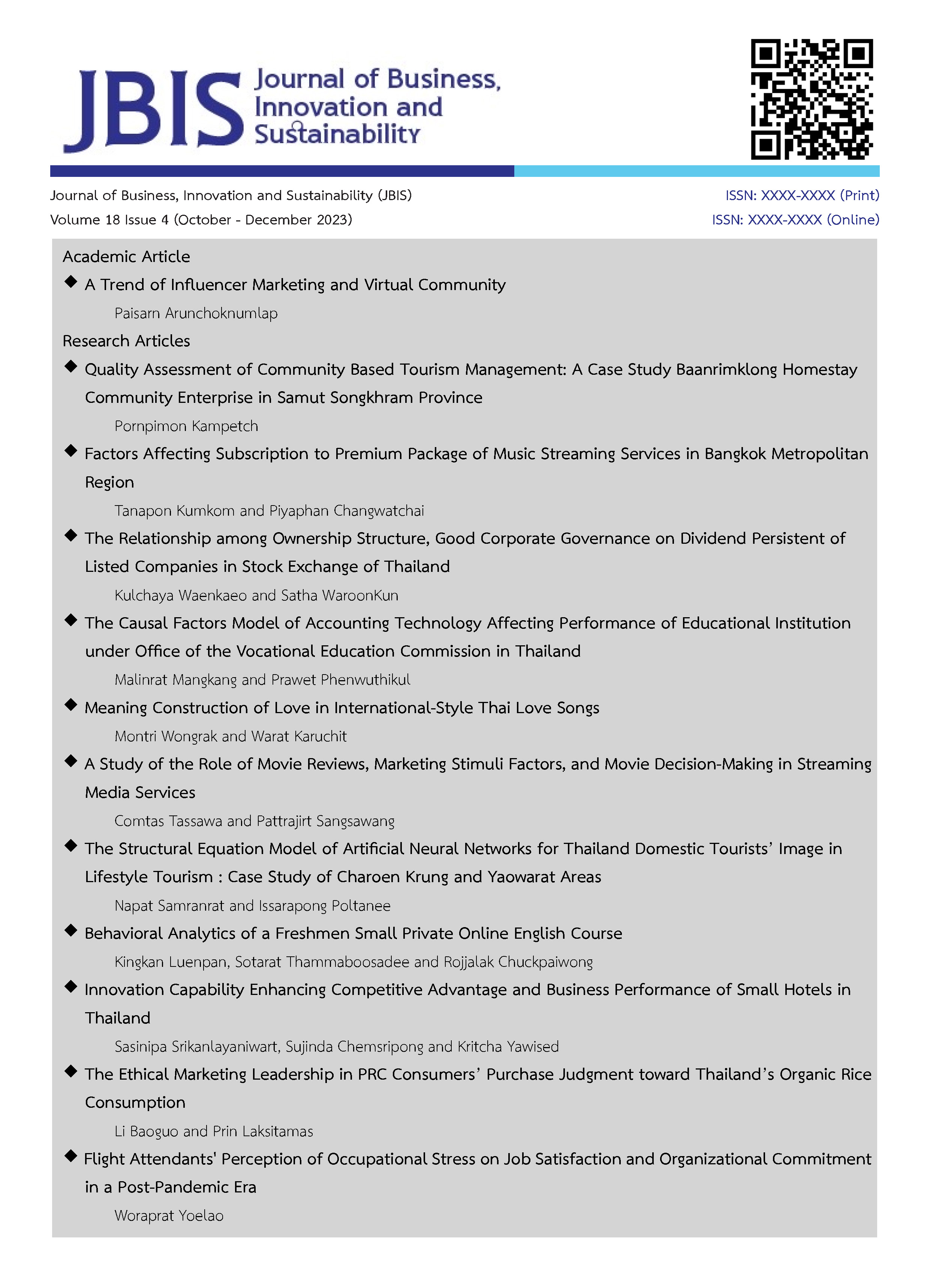Behavioral Analytics of a Freshmen Small Private Online English Course
Main Article Content
บทคัดย่อ
SPOC (Small Private Online Course) is an online learning platform combining classroom and online lessons. For the development of the SPOC, it is worth looking at learning behaviors in-depth throughout the course. As Higher Education courses in Thailand focus on English language benchmarking, this research decided to choose English Level 1 as a content course for the reading and grammar skills from August 2020 to June 2021. The descriptive analytics study conducted by Visual Analytics and K-Means Clustering, both student-level and lesson-level learning behavior. The result found four types of learners in Student-level learning behavior: 1) Intelligent, 2) Weak cognitive, 3) Inattentive 4) Unenthusiastic. Moreover, Predictive Analytics, for predicting learning quality through learning behaviors of each cluster by four machine learning models, were comparatively experimented with: Generalized Linear Model, Decision Tree, Random Forest, and Gradient Boosted Trees. The Optimization method is used for tuning the optimum parameter of each method. For student-level behavior prediction, the Unenthusiastic Decision Tree was 0.0449, and Lesson-level Weak-cognitive Gradient Boosted Trees was 0.0371 relative error. Additionally, the factor of importance in quality prediction was found that amount of quizzes was the essential variable among all clusters. The result of this research is that the instructors can further develop content and teaching methods in the course to truly meet the learners' needs.
Article Details

อนุญาตภายใต้เงื่อนไข Creative Commons Attribution-NonCommercial-NoDerivatives 4.0 International License.
เอกสารอ้างอิง
Blum, C., Chiong, R., Clerc, M., De Jong, K., Michalewicz, Z., Neri, F. and Weise, T. (2012). Evolutionary optimization. In Raymond, C., T. Weise and Z. Michalewicz (Eds.), Variants of evolutionary algorithms for real-world applications (pp. 1–29). Germany: Springer.
Cutler, A., Cutler, D. R. and Stevens, J. R. (2012). Random forests. In C. Zhang and Y. Ma (Eds.), Ensemble machine learning (pp. 157-175). New York: Springer.
Dobson, A. J. and Barnett, A. G. (2018). An introduction to generalized linear models (4th ed.). Boca Raton: Chapman and Hall/CRC.
Hamerly, G. J. (2003). Learning structure and concepts in data through data clustering. Doctoral dissertation, Ph.D., University of California, San Diego.
Han, W., Jun, D., Xiaopeng, G. and Kangxu, L. (2017). Supporting quality teaching using educational data mining based on OpenEdX platform. In The Frontiers in Education Conference (pp. 1–7). Indiana: Purdue University.
Kumar, V. and Garg, L. M. (2018). Predictive analytics: A review of trends and techniques. International Journal of Computer Applications, 182(1), 31–37.
Lu, H. (2018). Construction of SPOC-based learning model and its application in linguistics teaching. International Journal of Emerging Technologies in Learning, 13(2), 157–169.
Maslin, N. M., Consultant, P. and Ltd, S. S. (2010). Impact of modern technology. HF Communications, 3, 33–35.
Ministry of Higher Education, Science, Research, and Innovation (2021). Higher education plan to produce and develop the country’s people complete version 2021 – 2027. Bangkok: Ministry of Higher Education, Science, Research, and Innovation.
Nguyen, H. T. T., Chen, L. H. and Saravanarajan, V. S. (lecturer). (January 3-5, 2022). Using feed-forward backprop, perceptron, and self-organizing algorithms to predict students’ online behavior. In The 2022 16th International Conference on Ubiquitous Information Management and Communication (IMCOM) (pp. 1-5). Seoul: Republic of Korea.
Omran, M. G., Engelbrecht, A. P. and Salman, A. (2007). An overview of clustering methods. Intelligent Data Analysis, 11(6), 583–605.
Patterson, J. P. and Duer, D. (2006). High school teaching and college expectations in writing and reading. English Journal, 95(3), 81-87.
Patro, S. and Sahu, K. K. (2015). Normalization: A preprocessing stage. International Advanced Research Journal in Science, Engineering and Technology, 2(3), 20–22.
Prates, J. M., Garcia, R. E. and Maldonado, J. C. (2019). Small private online courses in computing learning: Evidence, trends and challenges. In Brazilian Symposium on Computers in Education (SBIE 2019) (pp. 129–138). Brasília: Brazilian Computer Society.
Suleiman, R. and Anane, R. (lecturer). (May 4-6, 2022). Institutional data analysis and machine learning prediction of student performance. In The 2022 IEEE 25th International Conference on Computer Supported Cooperative Work in Design (CSCWD) (pp. 1480-1485), Hangzhou: China.
Xu, J., Moon, K. H., Member, S. and Schaar, M. van der. (2017). A machine learning approach for tracking and predicting student performance in degree programs. IEEE Journal of Selected Topics in Signal Processing, 11(5), 1–13.
Yanta, S., Thammaboosadee, S., Chanyagorn, P. and Chuckpaiwong, R. (2021). Course performance prediction and evolutionary optimization for undergraduate engineering program towards admission strategic planning. ICIC Express Letters, 15(6), 567–573.
Zhang, G., Zhang, Y. and Ran, J. (2018). Research on clustering mining and feature analysis of online learning behavioral data based on SPOC. In The 13th International Conference on Computer Science and Education (pp. 629–634). Colombo: Informatics Institute of Technology.


